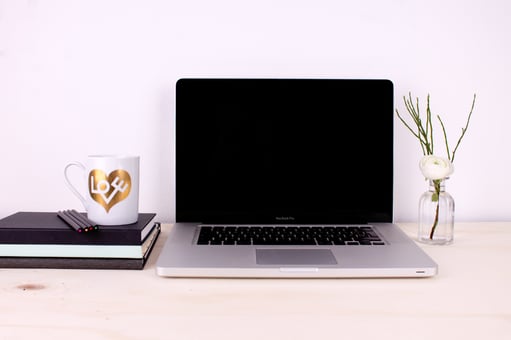With the current situation, many of us are working from home for the first time. That can take some getting used to, as one size doesn’t fit all when it comes to productivity. Some people need absolute silence whilst others find that a Spotify playlist helps them get in the zone. Some prefer a longer lunchbreak; others prefer to work through lunch and have short regular breaks to get away from their desk instead. It’s about finding what works for you.

Most of us fall into one category or the other; those who bury their heads in their laptops and don’t know when to switch off, and those who struggle to find the motivation or concentration to get into ‘work mode’. No matter what your situation, we’ve got some top tips to share with you that just might make your working from home life that little bit easier.
- Get started early (try to keep your normal routine hours).
The journey from home to the office is a great opportunity to wake up and prep for the day ahead. Unfortunately, the distance from pillow to laptop is a lot shorter and doesn’t give you that opportunity. Replacing this journey with something to kickstart your day is a good idea, whether that’s exercising first thing in the morning, having your porridge and berries, even simply drinking a glass of water. Maybe you need a coffee to get you going in the morning. Whatever your fix, use it to mark the start of your working day.
Then, create your daily to-do list. This will give your day structure and help you measure the productivity of your day. Make your list as specific as possible – break tasks down and be detailed so you can tick more things off, giving you a sense of achievement and not setting yourself up to fail by over-committing. It’s also important to log off at a reasonable time every night. We’ve all been tempted to just stay on and finish something we’re in the middle of. But making sure you get enough downtime will mean you can have another productive day tomorrow.
- Create the feeling of being in the office.
Have you ever tried to mow the lawn in wedding attire? We didn’t think so. So don’t try to work in your pyjamas! Getting up, showered and ready will help you maintain routine and get in the right mindset. The shift you experience when you walk into the office, put your lunch in the fridge and log on is a very physical shift from personal time to working hours. Whether you sit at a desk or at the kitchen table, we recommend setting up somewhere with a table and chair rather than a sofa or bed. Some people find that moving into another room halfway through the day for a change of scenery kickstarts creativity… whatever gets those juices flowing!
- Maintain the structure to your day.
Make use of your Outlook calendar to set appointment times for yourself. For example, some people find it helpful to assign half an hour a day to focus solely on emails, as knowing you have this allocated time can allow you to focus on the task at hand without becoming distracted and too reactive, replying to emails as they come in. Setting up a daily call or video conference with members of your team to keep the momentum going can be great for motivation. If you know what everyone’s working on and how your daily tasks fit into the wider picture, you can come away motivated with daily actions. If you need to call a colleague for something non-urgent, it can be more effective to put an appointment in their diary rather than calling out of the blue. Conversations are often much better if both parties have set aside the time and know what the conversation is about so they can prepare and utilise the time.
- Take regular breaks.
Fresh air is underrated. Ok, the time we can spend outside is limited in our current circumstances, but making sure you get your daily walk or run will boost your mental wellbeing as well as your physical health. Taking regular breaks is even more important at home, as often, you don’t have the social contact you’d get throughout the day in the office. Burying your head in your laptop all day without coming up for air can be stressful and you probably won’t be producing your best work. Sometimes you need to zoom out and gain some perspective. Coming back to what you’re doing with fresh eyes is really important as you’ll spot things you might have otherwise missed, and movement is proven to spark creativity. Making sure you drink enough water is also underrated. Hydration is proven to aid concentration, so taking mini breaks to go into the kitchen and re-fill your glass kills two birds with one stone.
- Stay sociable (whilst social distancing of course).
Some people find it easier to concentrate from home without the distraction and interruption of colleagues. But nevertheless, we’re (mostly) sociable creatures and we underestimate the need for some human contact. If you live with someone who’s also working from home, it’s a good idea to try to plan your breaks at the same time – go for your daily walk together, make lunch together, or just have a laugh for half an hour. Maybe you’re at home with the kids. If this is the case, you might need to split your break into smaller chunks, regularly checking on them when they’re suspiciously quiet, or stepping in to rewind Peppa Pig. If you live alone, why not ring a colleague who’s working from home and have a non-work-related catch up. Or if there’s a colleague you have your coffee break or lunchtime walk with, why not see if they want to FaceTime at a set time one day to keep up your routine?
- Limit distractions where possible.
If your distractions are children, this one can be very difficult! Next week, we’re publishing a range of content specifically for parents to entertain and educate children through this period, including fun resources and a competition to get them involved in. In the meantime, sites like BBC Bitesize and We Are Teachers are full of fun learning ideas to keep kids in the swing of things.
If you’re someone who’s easily distracted in general, it’s a good idea to be proactive and remove the temptation. Maybe you find yourself scrolling through social media all too often, or maybe you’re chief procrastinator; just putting that load of washing on, quickly hoovering the stairs, or just watching 10 more minutes of Good Morning Britain. If this is you then creating a routine you can stick to is important, allowing yourself breaks to check your phone and reply to messages periodically.
Once again, productivity is different for everyone. It’s about finding what works for you and gradually adjusting to your new office without putting too much pressure on yourself.
This is a financial promotion.
Health Shield Friendly Society Limited is authorised by the Prudential Regulation Authority and regulated by the Financial Conduct Authority and the Prudential Regulation Authority.
.jpg)


